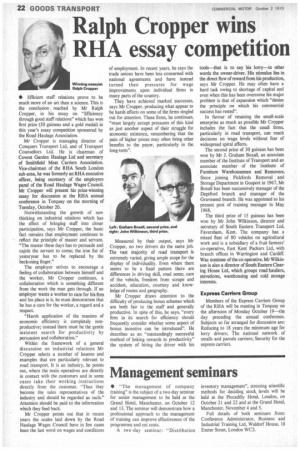Ralph Cropper wins RHA essay competition
Page 24

If you've noticed an error in this article please click here to report it so we can fix it.
• Efficient staff relations prove to be much more of an art than a science. This is the conclusion reached by Mr Ralph Cropper, in his essay on "Efficiency through good staff relations" which has won first prize (50 guineas and a gold medal) in this year's essay competition sponsored by the Road Haulage Association.
Mr Cropper is managing director of Conquers Transport Ltd, and of Transport Counsellors Ltd. He is chairman of Covent Garden Haulage Ltd and secretary of Smithfield Meat Carriers Association. Vice-chairman of the RHA South London sub-area, he was formerly an RHA executive officer, being secretary of the employers panel of the Road Haulage Wages Council. Mr Cropper will present his prize-winning essay for discussion at the RHA annual conference in Torquay on the morning of Tuesday, October 20.
Notwithstanding the growth of new thinking on industrial relations which has the effect of bringing staff into closer participation, says Mr Cropper, the basic fact remains that employment continues to reflect the principle of master and servant. "The master these days has to persuade and cajole the servant to come; the iron fist of yesteryear has to be replaced by the beckoning finger."
The employer strives to encourage a feeling of collaboration between himself and the worker, Mr Cropper continues, a collaboration which is something different from the work the man gets through. If an employer wants a worker to care for his firm and his place in it, he must demonstrate that he has a care for the worker, a regard and a respect.
"Harsh application of the maxims of economic efficiency is completely nonproductive; instead there must be the gentle insistent search for productivity by persuasion and collaboration."
Within the framework of a general discussion on industrial relations Mr Cropper selects a number of lessons and examples that are particularly relevant to road transport. It is an industry, he points out, where the main operatives are directly in contact with the customers and in some cases take their working instructions directly from the customer. "Thus they become the sales representatives of the industry and should be regarded as such." Attention should be paid to the information which they feed back.
Mr Cropper points out that in recent years the scales laid down by the Road Haulage Wages Council have in few cases been the last word on wages and conditions of employment. In recent years, he says the trade unions have been less concerned with national agreements and have instead turned their pressures for wage improvements upon individual firms in many parts of the country.
They have achieved marked successes, says Mr Cropper, producing what appear to be harsh effects on some of the firms singled out for attention. These firms, he continues, "must largely accept pressures of this kind as just another aspect of their struggle for economic existence, remembering that the pain of higher prices may often bring other benefits to the payer, particularly in the long-term".
Measured by their output, says Mr Cropper, no two drivers do the same job. The vast majority of road transport is extremely varied, giving ample scope for the display of individuality. Even where there seems to be a fixed pattern there are differences in driving skill, road sense, care of the vehicle, freedom from scrape and accident, education, courtesy and knowledge of routes and geography.
Mr Cropper draws attention to the difficulty of producing bonus schemes which are both fair to the staff and generally productive. In spite of this, he says, "every firm in its search for efficiency should frequently consider whether some aspect of bonus incentive can be introduced". He describes as an "outstandingly successful method of linking rewards to productivity" the system of hiring the driver with his tools—that is to say his lorry—in other words the owner-driver. His stimulus lies in the direct flow of reward from his production, says Mr Cropper. He may often have a hard task owing to shortage of capital and even when this has been overcome his major problem is that of expansion which "denies the principle on which his commercial success has rested".
In favour of retaining the small-scale enterprise as much as possible Mr Cropper includes the fact that the small firms, particularly in road transport, can reach decisions on wage levels without fear of widespread spiral affects.
The second prize of 30 guineas has been won by Mr J. Graham Boxall, an associate member of the Institute of Transport and an associate member of the Institute of Furniture Warehousemen and Removers. Since joining Pickfords Removal and Storage Department in Gosport in 1967, Mr Boxall has been successively manager of the Deptford branch and manager of the Gravesend branch. He was appointed to his present post of training manager in May 1968.
The third prize of 15 guineas has been won by Mr John Wilkinson, director and secretary of South Eastern Transport Ltd, Faversham, Kent. The company has a mixed fleet of 80 vehicles on agricultural work and is a subsidiary of a fruit farmers' co-operative, East Kent Packers Ltd, with branch offices in Warrington and Cardiff. Was nominee of the co-operative. Mr Wilkinson is also a director of South Eastern Clearing House Ltd, which groups road hauliers, stevedores, warehousing and cold storage interests.
Express Carriers Group
Members of the Express Carriers Group of the RHA will be meeting in Torquay on the afternoon of Monday October 19—the day preceding the annual conference. Subjects so far arranged for discussion are: Reducing to 18 years the minimum age for lorry drivers; The national network of smalls and parcels carriers; Security for the express carriers.












































































































